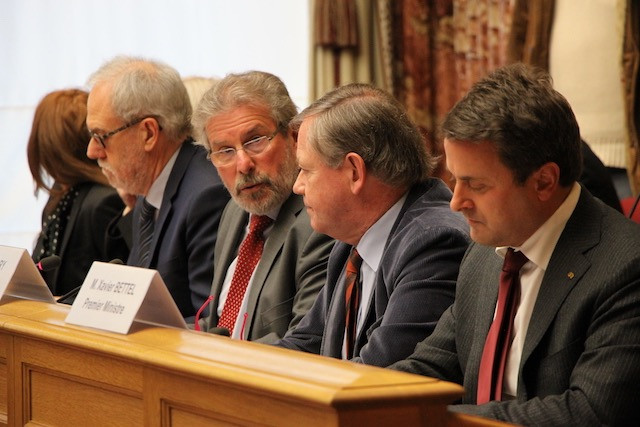Despite it being such a hot topic, both the petitioners and MPs stayed calm, respectful and on point during the debate. Lucien Welter, the author of the petition which gathered an impressive 14,500 signatures (only 4,500 were necessary to generate a debate), was adamant that his petition:
“has been interpreted in many ways, and words have been put in my mouth which I haven’t said and which were not written in the petition. What did I mean to achieve with this petition? I didn’t mean to abolish/replace the other two official languages. Our goal is to strengthen our language in public life.”
He admitted from the start that his proposals were not entirely thought through, but suggested nevertheless a few concrete changes: that court judgments should be translated into Luxembourgish at the request of one of the parties; that people could make their case in Luxembourgish in front of the judge; that public and para-public administrations should always reply in Luxembourgish when asked; all communication and publications by the government should be in Luxembourgish, and Luxembourgish should be more taught in schools. He insisted that:
“I am proud of the fact that I speak Luxembourgish, German, French, a bit of Italian, English, that I am multilingual. Every country has their own language, why not Luxembourgish? Why should we throw this away? But you need to be aware that we are our own country and we should treat it well/take care of it.”
A well attended parliamentary debate on the status of the Luxembourgish language, 16 January 2017. Photo: Chambre des Députés
When asked why he was afraid that the use of Luxembourgish would decrease or disappear, he answered that:
“if you look at how many people are projected to live here in the future--Luxembourgers cannot make enough babies to help our language to survive--I am sorry! We are obliged to have foreign workers- as Luxembourgish is our language of integration, let’s take it and start with that.”
Lucien Welter talks about his love for his mother tongue during a parliamentary debate on the status of Luxembourgish, 16 January 2017. Photo: Chambre des Députés
Daniel Rinck, who supported Welters, added:
“Luxembourgish should be the language of integration. The togetherness can only work with Luxembourgish. We need to think about how we manage our languages in school: first there are three languages and then English is added, albeit much later. We also need to promote English as a language a lot more, because we are a four language country. Talking about a three language country is the past. We need to find a way for our four language country, and Luxembourgish cannot be left out. We will have so much immigration and it is not certain that they will all be French or German speaking--so we need a common language. Which should it be? For me, it can only be Luxembourgish.”
Petitioners attract the attention of press shortly before a parliamentary debate on the status of Luxembourgish, 16 January 2017. Photo: Chambre des Députés
Xavier Bettel, the prime minister, was also present and pointed out that Luxembourgish was already one of the official languages. He addressed the concerns about the use of Luxembourgish in court:
“the situation is a bit more difficult. Our language has a smaller vocabulary, especially in the legal jargon. But nowadays everyone can speak Luxembourgish in a court of justice! The fact is, as you say, that when you have a judgment which you don’t understand, what do you do? There are two possibilities: in most cases you have a lawyer--ask him or her! Furthermore, the Service d’accueil et d’information juridique is free to anyone and can answer any questions.”
Petitions which gather at least 4,500 signatures must be debated in parliament. Photo: Chambre des Députés
Bettel also stated that never before has so much been written in Luxembourgish and mentioned the website lod.lu, an online dictionary which translates Luxembourgish into French, German, English and Portuguese. Bettel then said:
“I don’t accept it when people say ‘I don’t need Luxembourgish in Luxembourg’. I agree that it is the language of integration and binds us together. But our language is not facing an existential threat. We need to continue our efforts to have it spoken by as many people as possible, and we should not pitch one language against another.”
Bettel announced that the post of “commissioner for the Luxembourgish language” would be created. The conclusion was that Luxembourgish should be promoted while preserving the country’s multilingualism, and that the parties will search for a consensus on the next steps.




